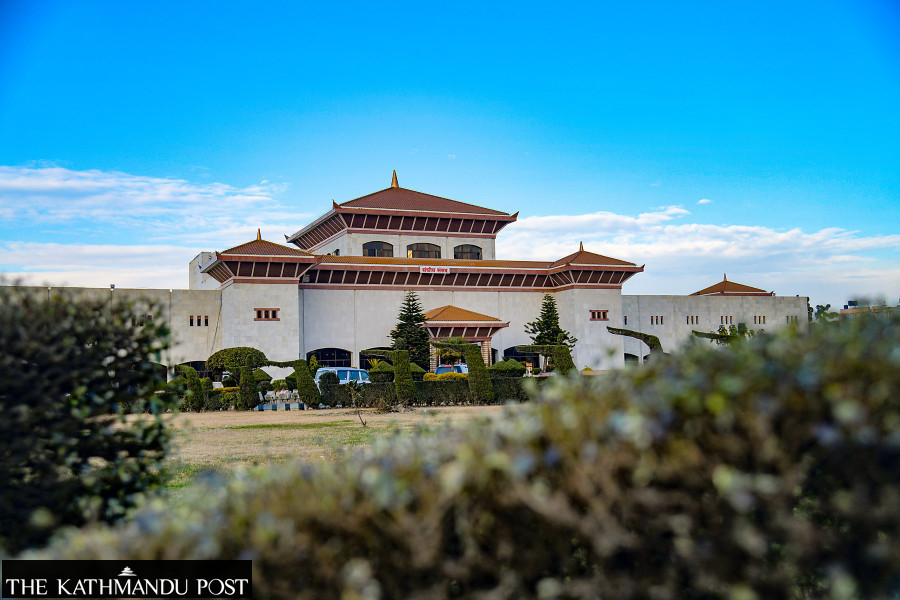Politics
Talks on to clear Parliament impasse, but no deal in sight
There is a rumour in the political circle that Prime Minister Sher Bahadur Deuba and CPN-UML Chairman KP Sharma Oli are aiming for early elections.
Anil Giri
Nepal’s state of affairs is in disarray. The country is currently facing a government shutdown situation, which means the Sher Bahadur Deuba administration has limited spending power to run the state entities.
The shutdown situation was created as the primary opposition, CPN-UML, has been obstructing the sessions of the lower house of Parliament in protest of Speaker Agni Prasad Sapkota. The UML is furious at Sapkota for not stripping the parliamentarian status of 14 of its lawmakers, including Madhav Kumar Nepal, who were expelled before they went on to form their own party.
The opposition protest continued even when Finance Minister Janardan Sharma presented the replacement budget in the House on September 11.
The next House session is set to convene on Monday. But there is still confusion whether the government will be able to pass the funding legislation amid a political impasse.
To avoid the situation, sources say the ruling Nepali Congress is engaging with the UML both at formal and informal levels.
However, the two parties have not reached any understanding yet on letting the House function smoothly.
There is a rumour in the political circles that both UML Chairman KP Sharma Oli and Prime Minister Deuba want to take the country to early elections because the former still believes that his party’s popularity among voters has not waned and the latter sees the Nepali Congress emerging as the largest party with the communist forces weakened by splits.
“Oli still wants the House dissolved just to see himself vindicated for dissolving the House twice when he was the prime minister,” said Bishwa Prakash Sharma, the Nepali Congress spokesperson.
He confirmed that the Nepali Congress is in talks with the UML to find a way out of the current impasse and there had been no concrete progress as of yet.
Anand Pokhrel, a UML leader close to Oli, also said the Nepali Congress is seeking an early deal for resolving the House deadlock but Oli is not ready.
“If the House obstruction is to continue, the country will go for early elections. And this is something Chairman Oli and Congress President and Prime Minister Deuba want,” Pokhrel said.
He said that Deuba might declare early elections before or after the 14th general convention of the Nepali Congress, slated for November-end, as per his comfort.
With his struggle to keep the ruling coalition together, failing to give his government a full shape even after two months of assuming office, and the looming Nepali Congress general convention with so many rivals challenging his leadership, Pokhrel’s claim that Deuba is after early elections makes sense.
However, a leader in the ruling coalition rubbished the notion of early elections.
“The fundamental understanding of this alliance is to run the government and Parliament for another 16 months. Deuba will not make the mistake of announcing early elections,” said the leader, who represents CPN (Maoist Centre), a key partner in the ruling coalition.
Nepal conducted its last general elections on November 26 and December 7 2017. So as per the schedule, the next general elections will have to be conducted by the end of 2022.
For early elections, the current coalition should break, the governing party should plunge into a minority and there should be no possibility of new government formation.
It’s a long shot, but not entirely impossible, say some leaders.
They said if Deuba tries to approve Washington’s $500 million Millennium Challenge Corporation grant, through Parliament—a sore issue among his coalition partners including CPN (Maoist Centre), the coalition could break.
There is sharp division among the ruling alliance over whether to ratify the MCC from the House. While the Nepali Congress and Janata Samajbadi Party have more or less agreed to ratify the MCC compact from the House, the Maoist Centre, Janamorcha Nepal and NCP (Unified Socialist), the newly formed party led by Madhav Kumar Nepal, are opposed to the idea.
Narayan Kaji Shrestha, a senior Maoist Centre leader, did not discount the possibility of the coalition breaking up over the issue of MCC ratification.
“If Prime Minister Deuba tries to ratify the MCC through Parliament, the present alliance would break up and the country could go to early elections,” Sherstha said.
Another coalition leader Upendra Yadav of the Janata Samajbadi Party also sees the possibility of early elections—but not because of the MCC dispute.
It will be because of the UML, he said.
“If the UML continues to obstruct Parliament, the relevance of Parliament will end, which Oli has been working to prove all along. Oli wants to fail this system by paralysing the House of Representatives” said Yadav.
Bishal Bhattarai, the UML chief whip, however, said that the UML does not want to be a source of instability and that their only disagreement is with Speaker Sapkota.
“Yes, we do stand against the MCC’s ratification through Parliament in its current form, but our primary concern right now is the Speaker Sapkota,” Bhattarai said. “We believe that he is not fit for the role of a Speaker.”




 13.12°C Kathmandu
13.12°C Kathmandu














